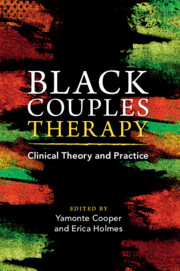Book contents
- Black Couples Therapy
- Black Couples Therapy
- Copyright page
- Contents
- Figures
- Tables
- Contributors
- Foreword
- Acknowledgments
- Introduction
- Part I Race, Racism, and Identity
- Part II Foundations for Healthy Coupling
- Chapter 4 The Foundations for Strong and Healthy Relationships between Black Men and Women: Purposes, Practices, and Processes
- Chapter 5 Considerations for Premarital Counseling and Education for Dating and Engaged Heterosexual African American Couples
- Part III Adapting Major Therapeutic Approaches for Work with African American Couples
- Part IV Sex and Intimacy
- Part V Special Topics
- Index
- References
Chapter 4 - The Foundations for Strong and Healthy Relationships between Black Men and Women: Purposes, Practices, and Processes
from Part II - Foundations for Healthy Coupling
Published online by Cambridge University Press: 27 July 2023
- Black Couples Therapy
- Black Couples Therapy
- Copyright page
- Contents
- Figures
- Tables
- Contributors
- Foreword
- Acknowledgments
- Introduction
- Part I Race, Racism, and Identity
- Part II Foundations for Healthy Coupling
- Chapter 4 The Foundations for Strong and Healthy Relationships between Black Men and Women: Purposes, Practices, and Processes
- Chapter 5 Considerations for Premarital Counseling and Education for Dating and Engaged Heterosexual African American Couples
- Part III Adapting Major Therapeutic Approaches for Work with African American Couples
- Part IV Sex and Intimacy
- Part V Special Topics
- Index
- References
Summary
This chapter provides an overview of some of the unique characteristics, strengths, and challenges for creating and sustaining healthy marital relationships between heterosexual men and women of African ancestry. The approach to this work is grounded within the emerging field of African-centered psychology that privileges the lived experiences of African Americans and summarizes a marriage empowerment program, Conversations in Marriage© (CIM), which uses African proverbs to promote situational learning. A definition of culture is developed to conceptualize healthy marriages, and challenges affecting Black marriage are discussed. Key foundations, practices, and processes of a cycle of healthy marriages are presented and implications for building stronger marriages are discussed. Each of these elements are discussed from a perspective that centers sustainable marriage within a framework of community growth, empowerment, and sustainability.
Keywords
- Type
- Chapter
- Information
- Black Couples TherapyClinical Theory and Practice, pp. 85 - 101Publisher: Cambridge University PressPrint publication year: 2023



